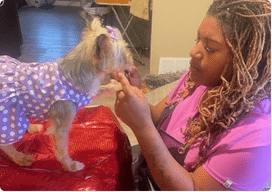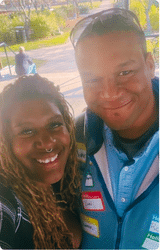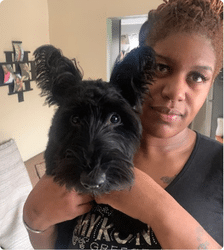 Paths to Progress: Loreal Black’s Story
Paths to Progress: Loreal Black’s Story
Paths to Progress: Loreal Black’s Story
From uncertainty to unstoppable, Loreal’s journey is one of quiet strength and unwavering love.
For most of us, the idea of starting over is intimidating. For Loreal, it meant re-entering a world she hadn’t been part of for 12 years. After spending more than a decade incarcerated, she was excited to go home—but also unsure. What would life look like on the outside? How would she reconnect with a world that had moved on without her?
“I was looking forward to going home,” she said. “But I was nervous about what that meant, and how much things would’ve changed.”
Healing While the World Stood Still
One of the hardest realizations for Loreal came after her release. While she had spent years healing, learning, and growing—many of the people she loved hadn’t. “It was hard to come out into a world with a lot of hurt people,” she explained. “I had been doing all this self-healing, but not everyone else had.”
That truth could’ve discouraged her. Instead, Loreal used it as fuel. The strength she built inside allowed her to face this new reality with grace—and a surprising amount of hope.
Finding Guidance and Grit with Televerde Foundation
When Loreal joined the Televerde Foundation’s program, she found more than just resources—she found a family.
“They held my hand every step of the way, through every challenge,” she said. “And they celebrated my success just as loudly.”
Having been incarcerated at such a young age, Loreal didn’t always know how to navigate the adult world. The women around her—mentors, peers, staff—became her guides. “They were like my aunts,” she shared. “They gave me advice on things I hadn’t had the experience with myself.”
And now? Loreal’s paying it forward. She mentors other women preparing to leave prison, making sure they know they don’t have to walk their path alone. “I want them to have an even smoother transition than I did,” she said. “They always have a family here.”
More Than a Comeback—It’s a New Chapter
Loreal didn’t just return home—she came back as a version of herself her daughter and parents could be proud of. “This isn’t the life we should’ve had to share,” she said about her time away. “But I came home even better—still loving and still caring. That’s not an easy feat in a place like prison.”
She’s already chasing big goals:
- Paying off the house and car she purchased
- Sending her daughter off to college
- Growing her dog business
- And yes, building a peaceful walkway in her backyard—a small dream, but one rooted in the joy of freedom
Staying Strong, Staying Real
When life throws its curveballs, Loreal doesn’t flinch. “Knowing I need to be a strong role model for my daughter helps me push through anything,” she said. “People learn by example. I want to be the best example I can be.”
She’s proud of the degree she earned behind bars—something that took time, sacrifice, and savings. But more than that, she’s proud to still be the sweet, loving person she always was. “People can’t even believe I was incarcerated,” she added with a smile.
Advice from the Heart
Loreal knows firsthand how hard it is to break free from unhealthy patterns, especially in relationships. Her advice? Take a step back and ask yourself if this is something that will help you or hurt you in the long run. And always think of the ripple effect—how your choices affect the people who love you.
Because if there’s one thing Loreal’s journey proves, it’s that transformation doesn’t just change you—it changes everyone around you.
About Paths to Progress
This blog series, curated by Natalie Medley for the Televerde Foundation, highlights the journeys of women who have overcome barriers, reclaimed their purpose, and built new lives after incarceration.Inspired by the Foundation’s PATHS programs—Prepare, Achieve, and Transform for Healthy Success—the series showcases how second chances, support systems, and self-determination lead to lasting transformation.
Through personal and professional growth, PATHS is breaking the cycle of recidivism and poverty, helping women return to their communities as role models and leaders of change.
